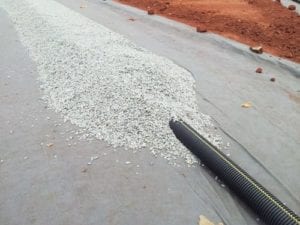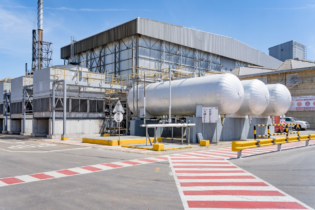When Civil Engineering consultancy company, Mhiduve, was recently appointed by Tlokwe Municipality in North West Province to design an extension for the Promosa Landfill site in Potchefstroom, ALS Construction was appointed as main contractor for the project. Generic specifications were given and the contractor chose Kaytech’s products for the construction of an effective drainage system.
This domestic waste disposal site had almost reached full capacity and due to biodegradation of the waste combined with seepage of rainwater, the potentially hazardous leachate generated was suspected to be loading the base of the landfill. Even with an in situ clay liner, leachate can contaminate ground water, and if not removed or isolated, renders compaction of the waste almost impossible. To overcome this problem, a conventional drainage system was installed, starting with Kaytech’s bidim A5, which would perform two functions in the sub-soil drain, that of filter and separator. Fine soil particles would be prevented from entering the drain thus lowering the phreatic surface in the surrounding soil. Bidim is a nonwoven, continuous filament, needle punched geotextile manufactured by Kaytech from 100% polyester, and as such has distinct advantages over other man-made fibres; an appreciable thickness, high porosity even under heavy loads, high resistance to puncture, tearing or burst, high drainage capacity in both the transmissivity and permittivity planes as well as a flexibility and conformability which is advantageous during laying operations. Prior to installation of the drainage system, clay was imported to construct a Compacted Clay Liner (CCL). Once this was in situ Flo-Pipe 160mm was bedded in the centre directly above the layer of bidim A5. Kaytech has manufactured Flo-Pipe to be very easily installed, even by unskilled labour; each length is supplied with one standard uPVC coupling, and a wide variety of bends, junctions and reducers allow Flo-Pipe to be easily adapted to onsite requirements. Flo-Pipe is optimally slotted for maximum infiltration with minimal blockage. Fabricated from the highest quality HDPE available, the twin wall sandwich design provides strength and flexibility. With HDPE being one of the most chemically resistant polymers available, Flo-Pipe is ideally suited for use in effluent waste removal, as in this application. The smooth inner wall ensures high flow velocity while the corrugated outer wall can withstand substantial confining pressure. It was because of the expected weight to be exerted on the drainage pipes at Promosa that Flo-Pipe was specified; due to it’s ability to withstand 22m of overburden gravel if bedded properly and covered with adequate stone as load support.One pipe diameter of 19mm stone was placed around the 160mm Flo-Pipe to provide adequate bedding, followed by another pipe diameter of 38mm stone, which equates to a double pipe diameter for load support over the pipes. To act as a filter, a final layer of bidim A5 was then placed over the 38mm stone and the rest of the drain.
The drainage system was then connected to a leachate evaporation pond by means of a non-perforated, ribbed Kayduct pipe (160mm x 60m).Ironically, plastic bottles removed from landfill sites similar to the one in Promosa, have been reengineered and reused as bidim in the landfill to protect the surrounding area by draining the leachate. Kaytech’s nonwoven continuous filament needle-punched polyester bidim geotextile is a unique product manufactured according to internationally renowned technology. As a 100% recycled polyester geotextile, the bidim content in this project equates to 33 370 recycled two-litre cool drink bottles. “Kaytech continues to provide innovative, engineering solutions using recycled PET (rPET) in their products. By doing so they support the recycling sector by assuring an end use market for rPET in South Africa” said Cheri Scholtz, CEO of PETCO, the industry body for recycling of PET plastic in South Africa. “We appreciate Kaytech’s ongoing support and their pioneering approach to developing their product range further- using rPET as a vital technical nutrient in their product and showing that plastic bottles are not trash”. She added. In total 5 300m2 of bidim A5 and 504m of Flo-Pipe 160mm were supplied for this project which commenced in January 2013 and was completed the following month. This highly effective and durable Kaytech drainage system will be preventing dangerous pollution of the surrounding environment far into the foreseeable future.






